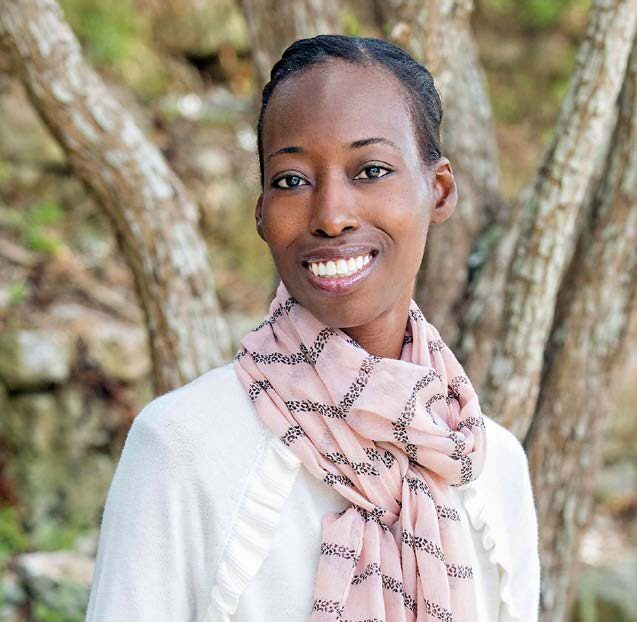Morrisa Rogers was just 40 years old when she was diagnosed with breast cancer. Now 42 and a healthy mom to her seven-year-old daughter, she looks back on that harrowing time in her life.
“I was diagnosed in December 2019. I was doing a self-exam and felt a lump in my right breast,” says Rogers, who works as the Director of Intellectual Disability at the Bermuda Hospitals Board.
Though breast cancer ran in her family, her doctor stopped performing mammograms on her when she was still all clear at age 35. “They said more screening and radiation may be detrimental, but I was actually due for a mammogram the year I discovered the lump.”
Fast forward a few months and Rogers found herself having surgery and a mastectomy in Boston, just months before the global pandemic might have delayed her treatment and derailed her travel plans. She was able to be back in Bermuda to receive chemotherapy and radiation therapy, be with her family, and work during her treatment. Her expenses were covered by her health insurance plan.
Others in Bermuda aren’t as lucky when they are diagnosed with cancer. Many families, including Rogers’ uncles and aunts and both her parents had cancer. “My dad had to go overseas for radiation treatment,” she says.
“I was fortunate to receive my treatment on the island at the Bermuda Cancer and Health Centre (BCHC) and be able to work. That’s why the Equal Access Fund at the Centre is so important. That fund helps people without enough coverage to navigate this concerning time in their life where you don’t want to be worried about finances—you just want to get the treatment you need.”
EQUAL ACCESS FUND
Azuree Williams is the Event and Programme Manager at the BCHC and is responsible for organizing the fundraising events that support the Equal Access Fund. “As a registered charity, we do not charge a co-pay for our clinical services, including mammography, ultrasound, breast and prostate biopsies and radiation therapy treatment.”
Where possible, the Centre receives some reimbursement from health insurance to cover some of the health-care costs, but not all services are covered 100 percent, and many people do not have health insurance.
“The Equal Access fund helps to subsidize the cost of services at our Centre,” says Williams.
“This fund is built by the members of our community. Through their support of our fundraising events, making donations toward the clinical services received at our Centre or making a contribution directly to our charity, they are making it possible for us to provide equal access to early detection and cancer treatment to everyone in our community.”
Last year, through events like the Breast Cancer Awareness Walk in October and the Man on the Run event in November, 444 Bermudians received assistance through the Equal Access Fund, including 99 people for radiation therapy and 345 for diagnostic imaging.
Other events that support the Equal Access Fund include Relay For Life, World Cancer Day, Denim Day and any third-party events that are hosted by others, including Girls Night In and school fundraising events.
So why should you participate?
“Giving to the Equal Access Fund can assist any of your loved ones or someone who is in dire need of screening or cancer treatment provided by our Centre and maybe uninsured or underinsured,” says Williams. “Providing equal access to our community saves lives. Rogers knows this first-hand.
“My dad had to go off the island for treatment,” she says. “Thanks to fundraising initiatives, we do have a cancer-care facility on the island. I couldn’t imagine taking six weeks to be off-island. It has a big impact on work and finances. That’s why the Equal Access Fund is very important.”
She takes part in fundraisers to help the cause, and believes it’s important for other Bermudians to get involved, too. “So many women are impacted by breast cancer in Bermuda,” says Rogers. “Whether it’s someone directly in your family or a friend, fundraisers ensure the experience someone has when they’re diagnosed is as easy as possible. If we’re all supporting fundraisers, we’re helping someone we know have an easier and smoother journey as they navigate this challenging experience.”
Rogers was also lucky to have a supportive husband, family and friends to help care for her daughter when she was away receiving treatment and encourages others to ask for help, including from support groups within your circle and outside of it. Though it was a scary experience, things are looking up.
“I’ve not had anything concerning since my final reconstruction surgery in May 2021,” says Rogers. “I’m relieved to put this all behind me. I hope that continues.”
To learn more or find out how you can help, visit www.cancer.bm.

